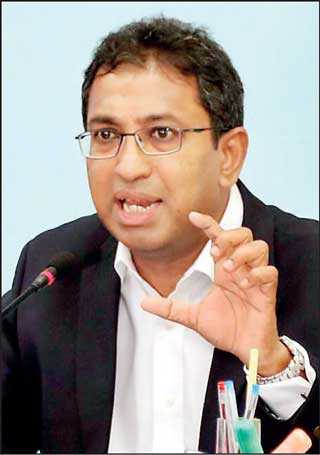Thursday Feb 26, 2026
Thursday Feb 26, 2026
Wednesday, 31 July 2019 00:00 - - {{hitsCtrl.values.hits}}
Public Distribution and Economic Reforms Non-Cabinet Minister Dr. Harsha de Silva yesterday outlined how the Government reduced rice prices by providing small and medium mill owners no-interest loans from an allocation of Rs. 1 billion.
 |
Dr. Harsha de Silva |
Addressing media at the Government Information Department, Dr. de Silva recalled that rice prices increased steeply at the beginning of the year, but were gradually reduced after the Government provided loans to mill owners to reopen their businesses, and increased competitiveness in the rice industry, which is dominated by a few players.
“When the price of goods increases, everyone talks about it, but when prices are stable or declining, no one talks about that. Rice is the most-consumed staple in Sri Lankan households. It typically takes up the largest amount of the food budget, but now prices have stabilised. We have gazetted the rice price and prices have come down, because we have ensured competitiveness in the market,” Dr. de Silva said.
The Government has assisted small and medium mill owners to open up shop again, and distribute rice to the marketplace under the brand name “Shakthi” to bring down prices. Under this scheme, Nadu has been sold at Rs. 80 per kilo and Samba at Rs. 85- Rs.95 per kilo. When this process was started about two months ago, Samba prices were at about Rs. 108 per kilo, but have reduced quite rapidly, he pointed out.
“Prices have reduced by about Rs. 13 across the board. As the harvest was good this time, warehouses have been stocked, and the same will be done during the Yala season. In this way we have empowered the small and medium businesses to make a change in the market. The benefits of this is directly felt by the households. We have done this by giving an interest-free loan to mill owners in eight districts, including Anuradhapura, Hambantota, Polonnaruwa, Kurunegala, and Ampara. This was done on a Government allocation of Rs. 1 billion.”
Cooperatives were established and funds were given by the banks directly to mill owners and farmers, so that they get multiple benefits. The program has strengthened both consumers and farmers by maintaining the market at a balanced level, he added. Dr. de Silva also said that each Shakthi bag of rice was equipped with a QR code, which will give full details of where the rice was from and when it was milled.